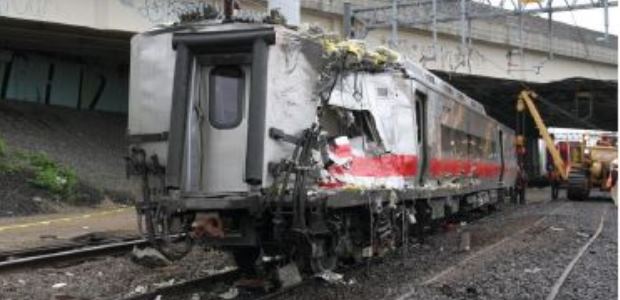
NTSB: Strengthen Requirements for Passenger Railcars' Vulnerable Ends
The safety board sent that recommendation on Feb. 2 to Sarah Feinberg, acting administrator of the Federal Railroad Administration.
The National Transportation Safety Board sent two safety recommendations Feb. 2 to Sarah Feinberg, acting administrator of the Federal Railroad Administration, that stem from NTSB's investigation of the May 17, 2013, incident in Bridgeport, Conn., when a Metro-North passenger train derailed and was hit by a second Metro-North passenger train traveling in the opposite direction at 6:01 p.m. At least 65 people were injured and the collision caused $18.5 million in property damage, according to NTSB, which determined the cause was undetected broken bars used to connect two rails of different heights. The board faulted the railroad's decision to defer scheduled track maintenance.
The new recommendations concern the federal standard that lists the forces M-8 passenger railcars must be capable of resisting during an impact. The Bridgeport trains consisted of these railcars, which are manufactured by Kawasaki Heavy Industries and made to be coupled in pairs: The F-end of each car has an operating cab, while the B-end has a mechanical coupler but no cab. NTSB’s recommendation letter states that the regulations set mechanical strength requirements for B-end corner posts that are less than half those required for F-end posts.
The Bridgeport collision showed why the B-end requirements should be raised, the letter states, because it involved an F-end striking a B-end of another car, causing significant damage. The letter calls this "a common type of collision – a sideswipe or raking collision."
The main recommendation asks FRA to revise 49 CFR 238.213 to require the same forward-end corner post strength requirements for the back-end corner posts of passenger railcars. The second recommendation asks for a regulatory change to require that a certificate of construction be furnished before the in-service date of a passenger railcar, as PHMSA currently requires before tank railcars are put into service.